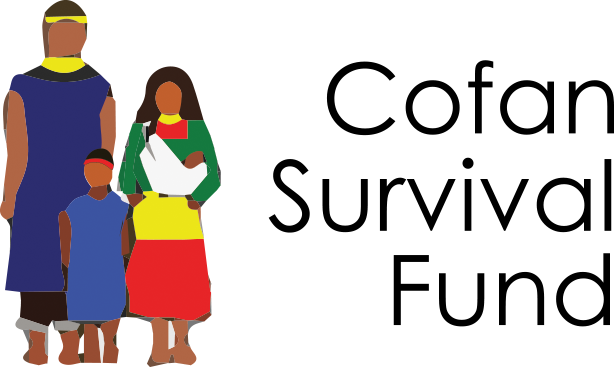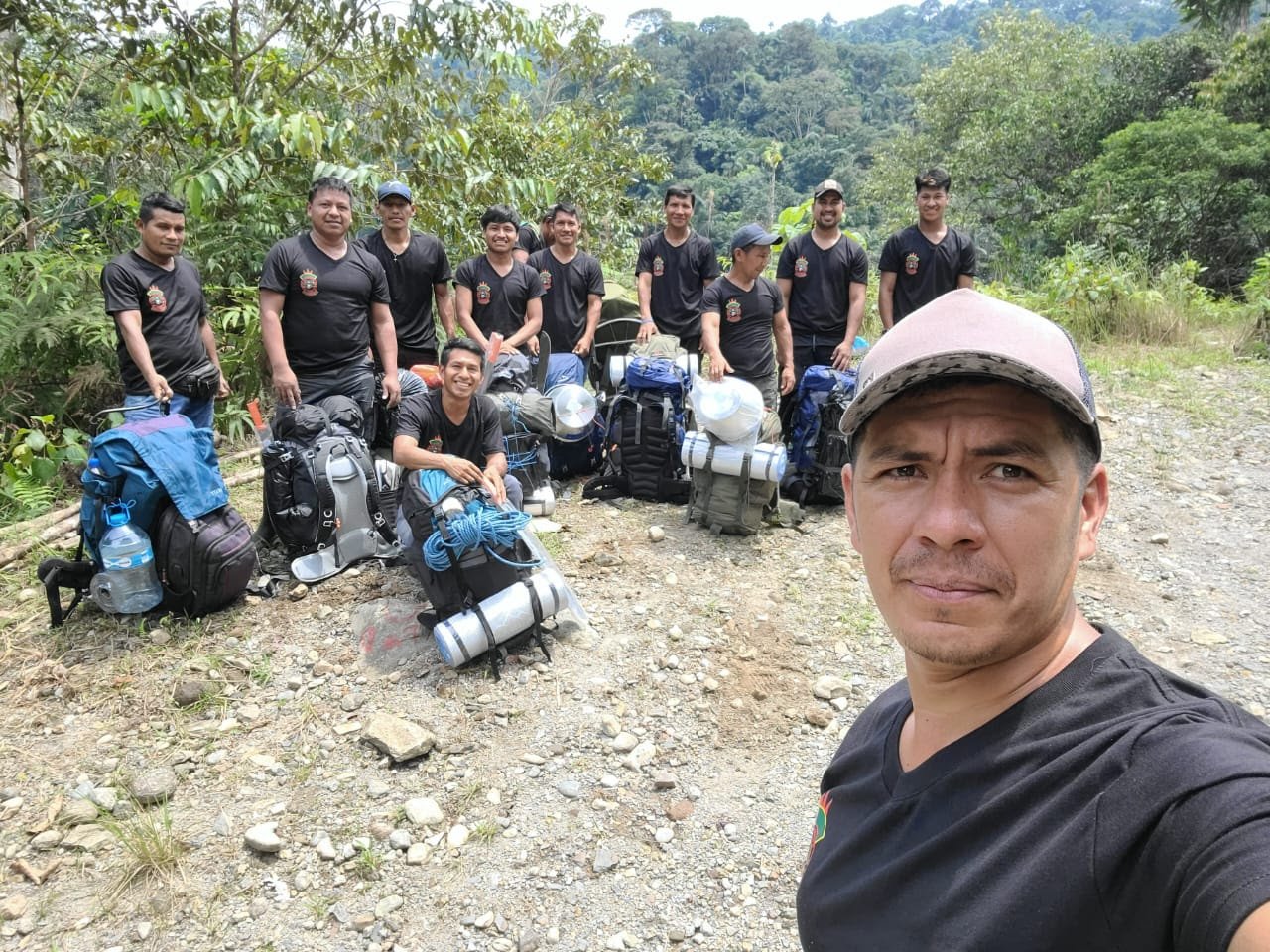Dear Cofan Survival Fund Supporters,
Where did February go? Where did March go? For all of us here at the Cofan Survival Fund, it has been a busy time. (Have I ever not written that at the beginning of a newsletter?) It’s high time I provide a short overview of what our Ecuadorian team has been working on so you know exactly what your donations are funding.
Freddy Espinosa: Freddy is our legal and bureaucratic expert. He does just about everything. An especially important achievement this month was pressuring the Ecuadorian government to legalize the newly elected community leaders of the Cofan and Ecuador’s other Indigenous Peoples. Ecuador has experienced extreme governmental transitions and is suffering a lack of funds, so the director who signs off on community leadership changes was . . . nonexistent—literally. No one was in the position. And without officially recognized leaders, Cofan communities can’t access resources, stay financially afloat, or sign checks or contracts or agreements. Freddy staged a one-man “sit in” at the office where this director was supposed to be and didn’t leave until someone assumed the position. Finally, someone did, which means Cofan and other Indigenous communities can now function. Freddy is also working with the new president of Zábalo to confront several developing land conflicts and to make sure titling issues for other Cofan lands are addressed. Freddy is a ball of energy, and we rely on him for so much.
María Luisa Lopez: María Luisa has been our accountant for decades. It’s impossible to run a nonprofit without solid accounting, and that’s what María Luisa does for us. Given how “irregular” our funding can be, her job is extremely complicated, and she has to perform miracles at times. Recently, she’s worked on end-of-the-year reporting for the Ecuadorian government and organizing insurance payments and policies for our Ecuadorian team. Without extra insurance, people like Randy would either be bankrupt or dead. And without car insurance for our Ecuadorian staff, we’d be unable to do anything. Unlike some wealthier organizations, our personnel do all their work—whether in cities, Amazonian forests, or Andean valleys—in their personal vehicles, which suffer terribly as a consequence. One day, we’d love to have a truck or two for our team. . . .
Carlos Menendez: Carlos is like Freddy: a force of nature who never stops working. Currently, Carlos handles our healthcare programs, especially the Seguro Campesino Project, which aims to cover the entire Cofan Nation. Seguro Campesino is a government program that’s a combination of Medicare and Social Security for Indigenous Peoples and others living subsistence lifestyles. But to become a member, people have to pay and enroll, both of which are impossible for many Cofan families. Through Carlos, we cover those obligations. Another activity Carlos organizes are the visits of Seguro Campesino medical teams to Cofan communities. There, doctors perform urgent procedures and do diagnostic work to identify problems and arrange for their treatment. Additionally, Carlos helps Cofan individuals and families negotiate the logistical and bureaucratic complexities of Ecuadorian medical institutions. He’s been aiding me with care for two Cofan people with whom I’m very close, both of whom are receiving life-saving treatments. One has bladder cancer, and the other has late-stage diabetes. If it weren’t for Carlos making everything work, they’d be in very bad shape and perhaps no longer with us.
Felipe Borman: Felipe is now the on-the-ground director for our land-protection and conservation work. And so much more. For the past year, he’s been coordinating and participating in all the fieldwork of the Cofan Park Guards in the two hotspots of the Cofan-Bermejo Ecological Reserve and the Río Cofanes Territory. Felipe just returned from Río Cofanes, where he led a team of 12 guards as they cleared boundary trails, reestablished Cofan strategic and residential sites, and let illegal miners know that it’s time to get off Cofan land. Felipe is just as courageous as Randy, and he’s the one member of our team who can handle all that the forest, the rivers, and the mountains throw at him. Without Felipe, our work to protect the Cofan homeland would be impossible.
Randy Borman: And what has Randy, our Executive Director and founder, been up to? Though no longer as spry as he once was, his health has returned. Randy remains our leader, our strategizer, and our visionary. He led the visits of two groups of important supporters to the far corners of Cofan territory, and he helped them understand what we do, why it’s important, and what else we could do with more resources. If you haven’t made a visit to Zábalo and met Randy, it’s time to do it. He knows more about his people than anyone else—certainly more than me, a mere anthropologist—and he also knows the Amazonian environment inside and out. Plus, he’ll convince you why the CSF is the Indigenous rights and forest-protection force the world needs. Randy steers the ship: he does all the research and organizes all the decision-making. Plus, he’s our main point person with all the individuals and organizations who support our work and keep us afloat. Though the rest of our Ecuadorian team is stellar, Randy is the axis around which everything revolves. And that’s a full-time job of emails and meetings and reports and trips to the field.
Other news: Amelia Quenamá continues to oversee our new Lifeboat Garden Project, which involves transplanting all the plant species essential to Cofan medical care and sustenance to a higher-altitude area, where we hope to keep them secure in a time of intensified climate change. Amelia is also working with Emmy Borman and Gissela Yumbo on our efforts to create a truly bilingual and bicultural school curriculum for Cofan communities.
Finally, our Cofan Higher Education Project is still at work. However, after this year, we have no funds to sustain this foundational program. This year, two Cofan MA students are finishing their theses in rural territorial development and intercultural justice, and two BA students are finishing their degrees in engineering and tourism administration. Without highly educated leaders, the Cofan Nation will not be able to weather the challenges it faces. It has hundreds of people who maintain traditional knowledge and ways, but the Cofan also need engineers, doctors, lawyers, and businesspeople if they hope to survive another 500 years. Education is one of our core missions. Please, if you have the interest or ability, consider donating to our Higher Education Project. We have brilliant young people finishing high school and looking to get a high-quality college degree. Without us, they can’t do it. Currently, the whole project runs on $50,000 a year. If we can no longer fund it, the long-term welfare of the Cofan Nation will be at tremendous risk.
If you’d like to discuss our Higher Education Project or anything else, feel free to write me directly at michael.cepek@utsa.edu so we can schedule a conversation. Once more, I’d like to remind you that our U.S.-based team is all-volunteer. Our board is always at work even though we have full-time jobs that put bread on our tables. 100% of your money goes to the staff and projects in Ecuador described above. Please help us keep them at work, as the future of a proud people and their rainforest homeland—which are essential to mitigating climate change and protecting biodiversity—is essential to our future as well.
Sincerely,
Michael L. Cepek, CSF President
CSF is a 501(c)(3) non-profit organization, and donations are tax deductible to the fullest extent allowed by law. For gifts of $250 and larger, you will receive a receipt for tax purposes.

